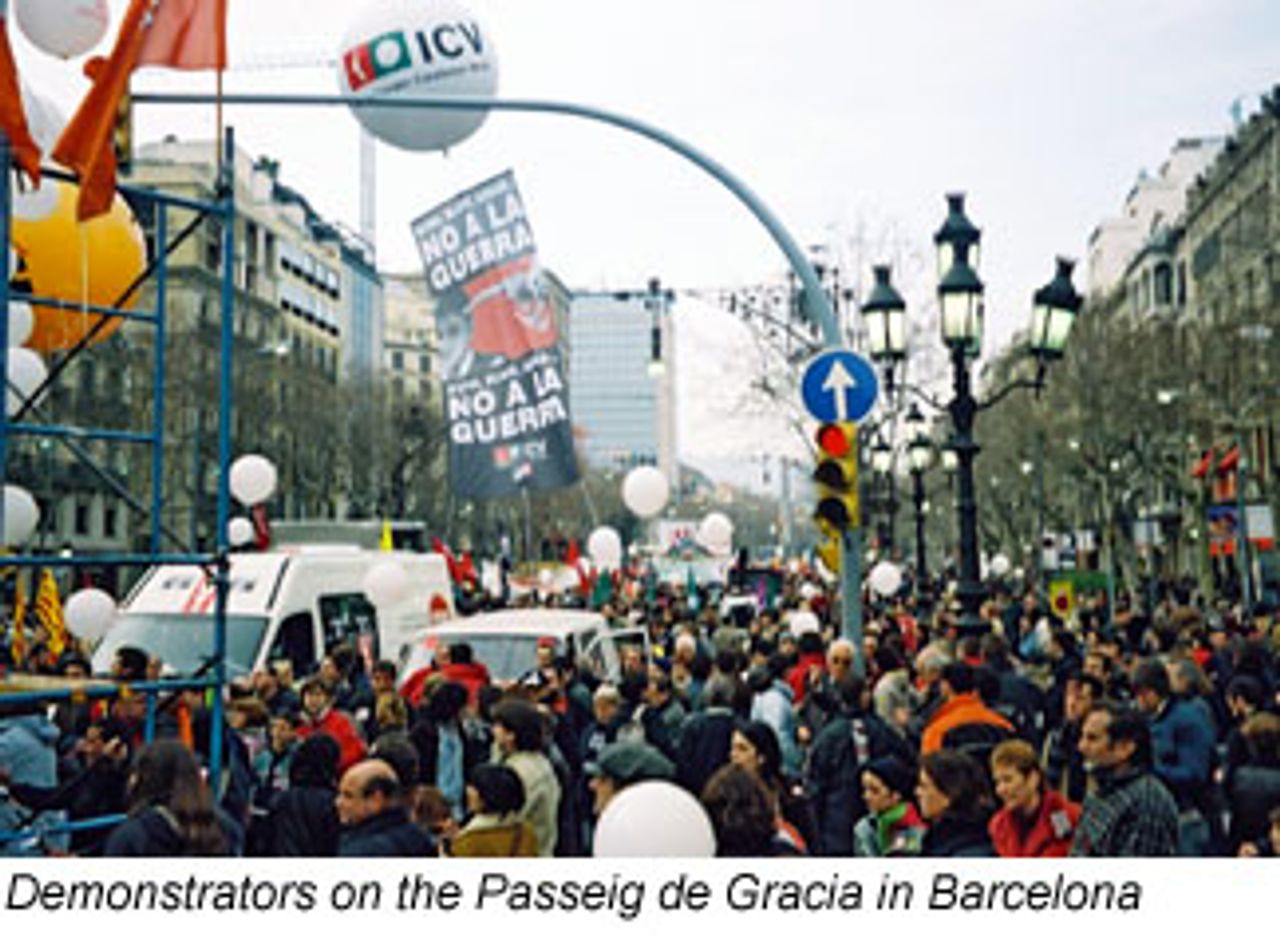Antiwar demonstrators mobilized in 57 Spanish cities on Saturday as part of what El Mundo described as “the first global protest in the history of humanity.”

The government of Jose Maria Aznar has lined up as the most loyal European supporter of military action against Iraq. It has done so in defiance of public opinion. A recent survey by Radio Madrilene Cadena Ser, for example, indicated that 91 percent of Spain’s 39 million people oppose any such action.
Under these conditions, the demonstrations expressed a combination of opposition to the coming war with anger over the government’s open contempt for the will of the broad mass of the population.
In Madrid, some one million took to the streets. In Barcelona the turnout was even larger. The following figures for some of the local demonstrations give an idea of the scale of the protest:
* Valencia saw a demonstration of half a million.
* 560,000 demonstrated across the whole of Andalucia.
* 300,000 marched in Zaragoza.
* There was a demonstration of 150,000 in Bilbao, supported by some 50,000 demonstrators elsewhere in the Basque region.
* Oviedo saw 125,000 march.
* 100,000 demonstrated in Vigo.
* 70,000 turned out in Las Palmas.
* Pontevedra, Santiago de Compostela and Valladolid all saw demonstrations of between 30,000 and 40,000 people.
* The smaller regional city of Salamanca held a demonstration of 20,000.
In Barcelona, the numbers far exceeded even the organisers’ expectations. There were many young people, but also a large number of entire families. The demonstration comprised a broad range of social layers, with many middle-class professionals joining workers and youth. Commentators spoke of the demonstration being “from the bottom up” and the outcome of the efforts of Barcelona’s citizens.
It had been expected that the protest would proceed in the manner of many previous demonstrations. A single banner stretched across the road, carried by local politicians and trade union officials, would lead the demonstrators to their destination. In fact, demonstrators poured in from every available side street, and the banner ended up a long way behind the front of the march. The officials were overwhelmed by the crowd.
When the speeches began, the official banner had covered only half the route. As a result, demonstrators at the intended starting point did not move for some hours while the march lengthened in front of them. The speeches at the Placa de Tetuan were repeated four times as demonstrators continued to arrive.
The protests coincide with legislation placed by Aznar before the parliament that would shift official responsibility for launching military action. At present, only the King can declare war. Under the proposed new law, the prime minister (Aznar) would be able to “conduct the leadership of a war or military action”. Many were protesting this proposal.
Protesters who spoke to the World Socialist Web Site expressed hostility to the government over the issue of the war, and pointed to Aznar’s lack of a mandate for such action. “His days are numbered, and so are Blair’s,” one demonstrator said.
There were slogans comparing Bush to Hitler, and Aznar to Franco. Demonstrators chanted, “Money for public services, not for bombs!”
Aznar was frequently described as a war criminal, and many placards referred to the US government having originally supplied Saddam Hussein with the weapons they are now accusing him of concealing.
Largely lacking was a political perspective to combat the drive to war. There were few organisations selling literature, and few leaflets. Although there were small contingents from the UGT and CCOO trade unions, and a handful from the Catalan counterpart of the Socialist Party, most of the visible placards and banners were those of the antiwar coalition. There was a visible presence of the Catalan Greens and various pacifist organisations.
Only a few speeches were delivered at the end of the march, and they were invariably punctuated and curtailed by those who started up mass chants of “No a la Guerra!”
Most of the leaflets handed out came from the antiwar coalition. Their perspective is that “when the bombardment begins” they will hold another demonstration, to be followed by a further one a week later.
The World Socialist Web Site team was swarmed by protesters as soon as we produced our leaflet, “The tasks facing the antiwar movement.” People queued up to get copies. There was a keen desire to obtain a political analysis. There was also broad scepticism toward the mass media. The camera crews in the Placa de Tetuan were repeatedly asked by demonstrators to report the march honestly.
Sergio, a student, told the World Socialist Web Site:
“I am here because we could be involved in this war and there are no proven reasons to attack Iraq. America is trying to bully everyone. The United Nations could work if they defended more the interests of the workers. As far as Aznar is concerned, he only thinks of the interests of the corporations and never the working classes who are the ones who have built the country. We are fed up. This demonstration and all the others held all over Spain show that the majority of the people think one way and Aznar thinks another way.
“The question is not just to demonstrate one day. The struggle has to continue and we must find a way to unite and tell Aznar and the leaders of the other countries that we will not fight their wars.”
Ariadna, who is 22, said, “I am here to oppose war, any war, whatever the reasons. I am against the imperialism of the United States, which believes it is the king of the world. It hurts that this type of imperialism is supported by Spain. There are two motives for Bush to go to war on Iraq: firstly, the oil that is there which they want, and secondly, they need war to continue producing arms and making profit.
“I would oppose war even if the United Nations supported it.”
